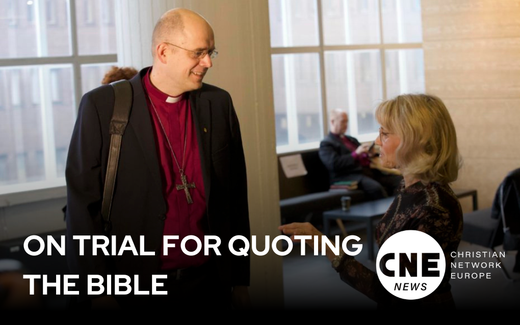Secular justice? Thoughts on the trial of Päivi Räsänen
11-11-2025
Opinion
Elina Placentino

Päivi Räsänen during the trial. Photo ADF International
Opinion
The Finnish politician Päivi Räsänen was questioned extensively on her motives and her faith during the investigation of her tweet and pamphlet on homosexuality. What does this tell us? Elina Placentino from Finland reflects on the court case.
Before her trial at the Supreme Court of Finland on the 30th of October, Päivi Räsänen expected her interrogation to focus on the motives and intentions behind her tweet and pamphlet concerning homosexuality. Although Räsänen said she was at peace with her trial, her expectations should alarm any responsible citizen.
And here is why: according to the Bible, only God can know and judge the heart. State authorities neither have the authority nor the competence to do so. This can be seen, for instance, when God told the prophet Samuel that “People look at the outward appearance, but the LORD looks at the heart” (1. Sam. 16:7).
Why is it, then, that Räsänen expected state authorities to grill her on her motives?
Crime
Naturally, intentions play a role in judging crime. Jesus himself declared that sin begins in the heart. Adultery begins with lust, murder with hate. And yet, no one in their right mind would ask the police to intervene in cases of unexpressed lust or hate. Motives and intentions come into play only if and when a crime has already been committed.
Fallible and finite, man cannot take the place of our omniscient God as judge.
Nonetheless, Western courts are increasingly dealing with ambiguous questions of offence, interpretation of words and intention. The trial of Päivi Räsänen is only one case in point. Why is this? Could it be a fruit of atheistic humanism? I believe so.
In turning from the Christian faith, our Western nations have replaced faith in God with faith in man. Man is seen to be the measure of all things — and thus man must be the judge of all things, as well. As can be seen, however, being the measure of all things and the judge of all things poses more than one problem to mankind. Fallible and finite, man cannot take the place of our omniscient God as judge. Our imprecision in judgment is precisely one of the reasons the Bible instructs us to refrain from it (Luke 6:37).
In fact, God does not intend the state to judge all sin, but all crime. And His Word provides clear guidelines for a healthy judicial system. Criminal actions are to be judged with the perpetrator’s motives in mind. However, evil intentions are not the concern of the state. They are judged by our all-seeing and all-knowing God. In quoting a Bible verse and expressing her Biblical understanding of homosexuality, Räsänen did nothing criminal. Case closed. Her actions were already acquitted by both the Helsinki District Court and the Finnish Court of Appeals. And when no crime has been committed, prying into a citizen's inner motives is an overreach of the state.
Justice
Not believing in God as Judge causes another societal problem. People are anxious to experience justice, but without faith in God to provide it, they look to the state. If human courts are seen as the ultimate providers of justice, people may eventually appeal to the state in all matters they deem unjust or hurtful. The state is already being called on to solve petty relational offences rather than true crime.
A sound understanding of God as Judge would release our judicial system from the pressure it is presently facing.
And lastly, there is the perspective of eternity. When man believes in God and the final judgment, he can bear with injustice on earth with more grace. He knows that the day will come when “we must all appear before the judgment seat of Christ, so that each of us may receive what is due us for the things done while in the body, whether good or bad” (2. Cor. 5:10).
A sound understanding of God as Judge would release our judicial system from the pressure it is presently facing. In God, we have the assurance that people’s hearts are perfectly searched and judged. This both comforts us and inspires us to fear the Judge of all the earth.
What a liberating thought it is, that judgment belongs to God! Our temporal justice is fallible, but the Christian can always trust and entrust himself to “him who judges justly” (1. Peter 2:23). Räsänen is an inspiring example of this liberty. Why was she able to remain peaceful before a human court that she expected would intrude on her privacy? It is only because she, like Moses, knew that ultimately “judgment belongs to God” (Deut. 1:17).
Related Articles









